As attacks on Jews increase nationwide, a new kind of anti-Semitism spreads in some unlikely places
Last month, during the three weeks between a deadly shootout that killed six people, including a police officer, at a kosher supermarket in Jersey City, N.J., and a machete attack at a rabbi’s house in Monsey, N.Y., that left five wounded, police in New York City received at least eight reports of possible hate crimes targeting Jews across the city, six within the week leading up to the Monsey stabbings, which coincided with Hanukkah. In response, New York City Mayor Bill de Blasio announced that the NYPD would be ramping up patrols in Brooklyn neighborhoods with large Jewish populations. Synagogues and other locations would also see increased police presence, de Blasio said.
Most of the assaults were of the misdemeanor variety — slaps, shoves, kicks and verbal abuse, according to the NYPD. But authorities are treating them as hate crimes, marking a violent end to a year in which reports of anti-Semitic hate crimes skyrocketed across New York City. As of Dec. 30, the NYPD said it had received 229 reports of anti-Semitic hate crimes since the beginning of 2019, a 24 percent increase over the same period in 2018. According to the NYPD, suspected anti-Semitic attacks made up more than 54 percent of all hate crimes reported in New York City last year.
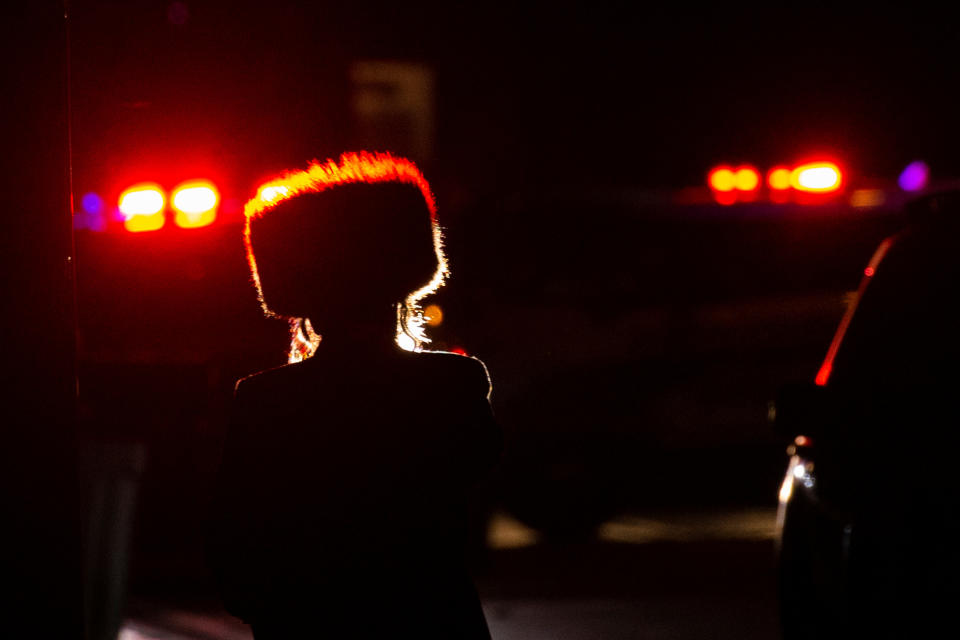
And they are part of a pattern of increasing attacks on Jews across the United States in recent years, including the deadly assaults on synagogues in Pittsburgh and Poway, Calif., that killed 12. According to a forthcoming report by the Center for the Study of Hate and Extremism at California State University, San Bernardino, anti-Semitic hate crimes in the country’s three biggest cities (Chicago, Los Angeles and New York) are approaching numbers not seen since the overall spike in hate crimes after 9/11.
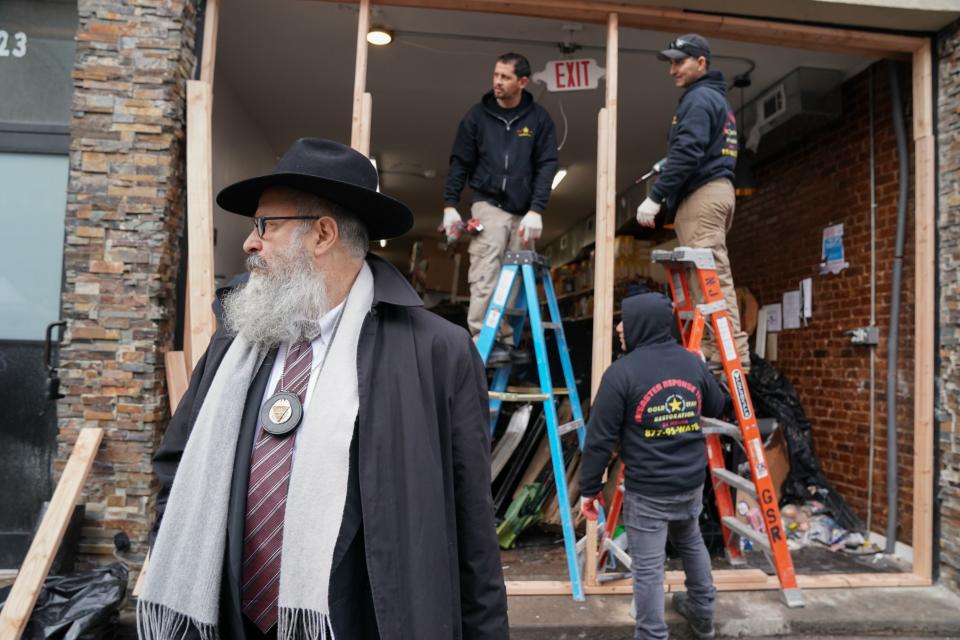
But while the broader resurgence of American anti-Semitism takes the form of white supremacy and other far-right extremist ideologies, including outright Nazism, the incidents in New York and its suburbs stem from different causes — principally, long-standing tensions between the tight-knit ultra-Orthodox communities and their neighbors, often rooted in what amount to turf fights over real estate, exacerbated by the region’s notoriously tight housing market. Generally the victims are identifiably Jewish members of one of the Hasidic sects, who are easily recognized by their distinctive dress and hairstyles (long dresses and wigs for women; long black coats, beards and sidelocks for men).
Hasidic families are typically large, and adherents of the Lubavitcher sect, whose worldwide headquarters are in the Crown Heights section of Brooklyn, have been expanding into surrounding African-American neighborhoods. Others have begun moving out of New York City altogether, seeking bigger homes in more affordable suburbs, notably in New York’s Rockland County and Ocean County, N.J. There they have encountered new versions of anti-Semitism, playing out on social media and in community zoning and school board meetings over issues such as housing density, the operation of businesses, synagogues and schools in residential homes and control over local school boards.
However, posts on social media accounts dedicated to discussing these topics demonstrate how quickly conversations about such mundane local issues can broaden into resentment of newcomers who have distinctive customs, celebrate different holidays, close their businesses on Saturdays and generally speak Yiddish among themselves. Ultra-Orthodox Jews send their children to religious schools and observe strict dietary rules, patronizing kosher markets and restaurants, among other customs that set them apart from their neighbors.
Organizations that fight anti-Semitism see these recent incidents as part of a continuum with the deadly attacks that have alarmed Jews around the country. Orthodox Jews “have every right to move to any part of the state or around the area they want, and unfortunately, anti-Semitism is following them as they are moving into these communities,” said Evan Bernstein, regional director for the Anti-Defamation League in New York and New Jersey. Bernstein told Yahoo News that while the recent spate of violence against ultra-Orthodox Jews in New York and New Jersey may reflect local tensions, it is no less concerning than the kinds of attacks that start with someone reading “The Protocols of the Elders of Zion.”
“What’s happened here in Jersey City, in Monsey, and what’s going on consistently now in Brooklyn is not white supremacy,” said Bernstein. “It’s a different kind of anti-Semitism, but it’s anti-Semitism ... targeted at a specific demographic of Jews, and it’s incredibly disconcerting.”
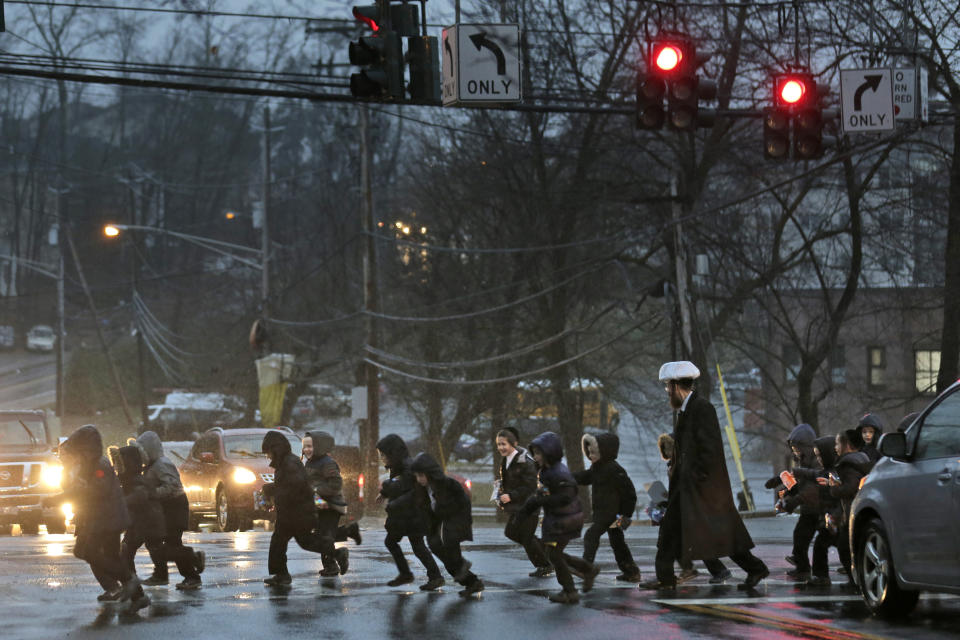
It’s unclear what, exactly, motivated the attackers in Jersey City and Monsey, which have become home to growing Hasidic communities in recent years. Both of the suspected shooters in Jersey City were killed in the shootout at the kosher grocery, which law enforcement officials have said they believe was the intended target of the attack. Potential clues about the suspects’ beliefs emerged in the immediate aftermath of the shooting, including anti-Semitic social media posts and rants against police and alleged ties to Black Hebrew Israelites, fringe sects of African-Americans unaffiliated with mainstream Jews who believe that they are the true descendants of ancient Israelites.
“We believe the suspects held views that reflected hatred of the Jewish people, as well as the hatred of law enforcement,” New Jersey Attorney General Gurbir S. Grewal said at a press conference following the shooting, where he announced that the attack was being investigated as domestic terrorism.
But the response of some in the community shocked Jewish leaders almost as much as the attack itself. In a since-deleted Facebook post, Joan Terrell-Paige, an elected member of the Jersey City school board, suggested that the shooters may have been expressing the anger of African-Americans who feel “threatened, intimidated, and harassed” by Jewish “brutes” who, she wrote, “waved bags of money” at people to pressure them into selling their homes. The Jersey City mayor, the New Jersey governor and the Board of Education president all called on Terrell-Paige to resign, which she has declined to do (or apologize).
But many others came to her defense, including the Hudson County Democratic Black Caucus, which issued a statement, signed by several local officials, insisting that while they do not condone hatred or agree with the way Terrell-Paige expressed her views, “we believe that her statement has heightened awareness around issues that must be addressed and should be a topic of a larger conversation by two communities.” Community members even held a candlelight vigil to show their support for Terrell-Paige. This week, a local official with the NAACP in Montclair, N.J. — an upscale suburb known for diversity and progressive politics — was suspended after criticizing Hasidic Jews at a community meeting about gentrification, where he said that African-Americans in Jersey City and Montclair live in “fear of being replaced by these strangers who really aren’t friendly.”
“It’s outrageous that anyone would try to make an argument that people buying homes is what’s causing hate and anti-Semitism and what rationalizes somebody trying to kill and hurt,” New York state Sen. Simcha Felder told Yahoo News. Felder, who represents a heavily Orthodox district in Brooklyn, said those moving to the suburbs are simply trying to “live the American dream.”
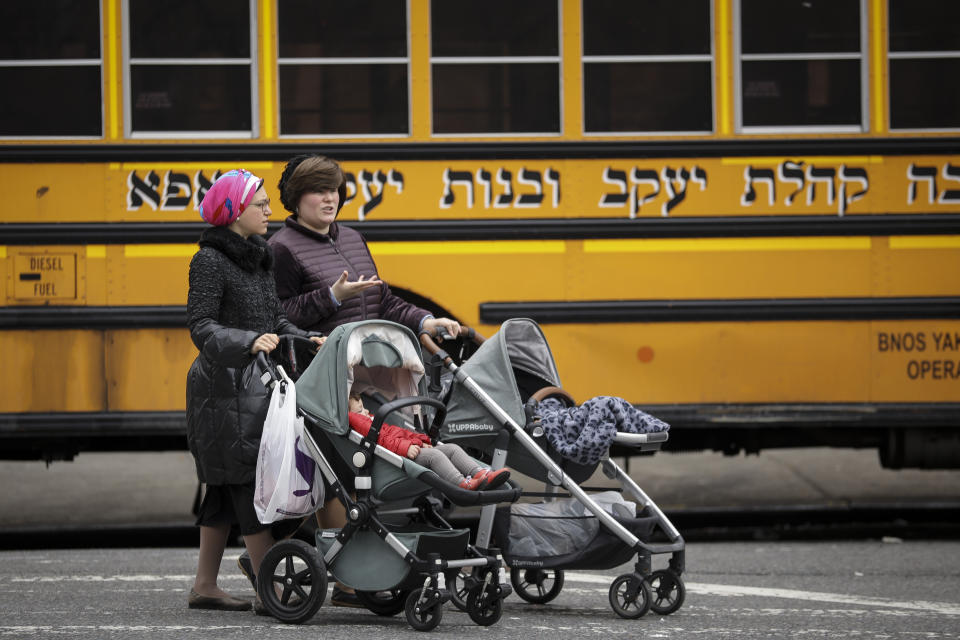
Yossi Gestetner, head of the Orthodox Jewish Public Affairs Council, expressed outrage over what he sees as attempts to legitimize violent attacks on Jews by focusing the narrative on local concerns about “overdevelopment” and accusations of aggressive attempts to pressure residents to sell their homes. He argued that such claims are meritless and are regularly spread on social media to “fuel people to take things to the next level.”
“Even if one of 10 or two out of 10 salespeople behave this way,” he said, to make such generalizations about an entire community is “bigoted,” especially when describing the victims of targeted violence.
“Such a conversation would not be had after African-Americans are shot up in a church in some Southern state,” Gestetner told Yahoo News.
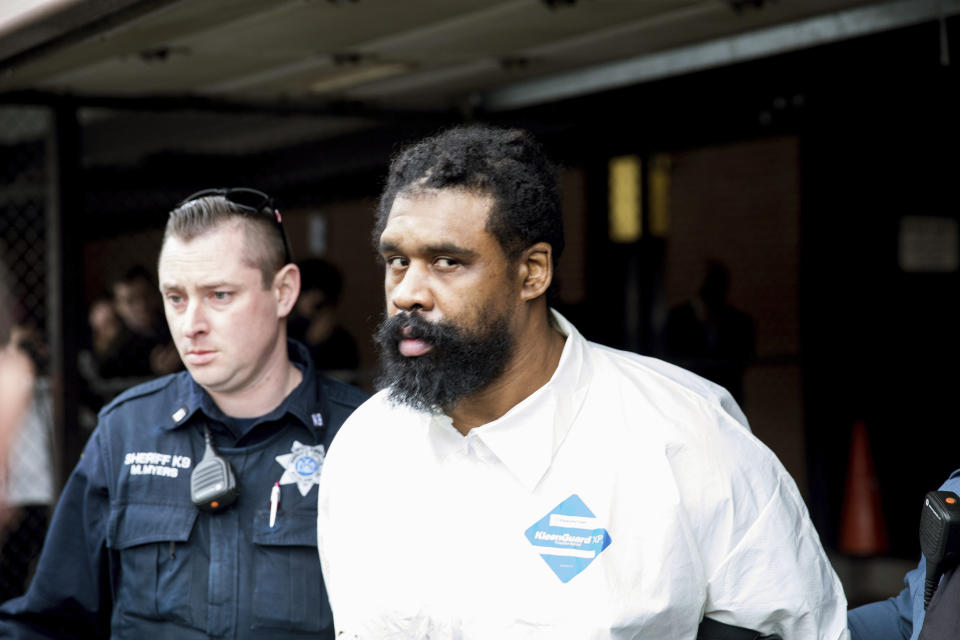
In addition to five state counts of attempted murder for which he has already pleaded not guilty, Grafton Thomas, the suspect arrested for the stabbing attack at a rabbi’s home in Monsey, also faces federal hate crime charges based on the results of an FBI search of his home. According to a federal criminal complaint, agents found, among other things, handwritten journals filled with anti-Semitic sentiments and symbols, including references to Adolf Hitler, “Nazi Culture” and Black Hebrew Israelites. His cellphone’s internet history allegedly revealed that Thomas had conducted several recent searches for phrases such as “temples near me,” “prominent companies founded by Jews in America” and “Why did Hitler hate the Jews?”
Thomas’s family denied he was motivated by anti-Semitism; a statement from his lawyer claims he suffers from a “profound mental illness.” Last week, police said they were now looking into whether Thomas may have also been involved in an earlier attack from November, in which a Hasidic man was stabbed outside a synagogue in Monsey.
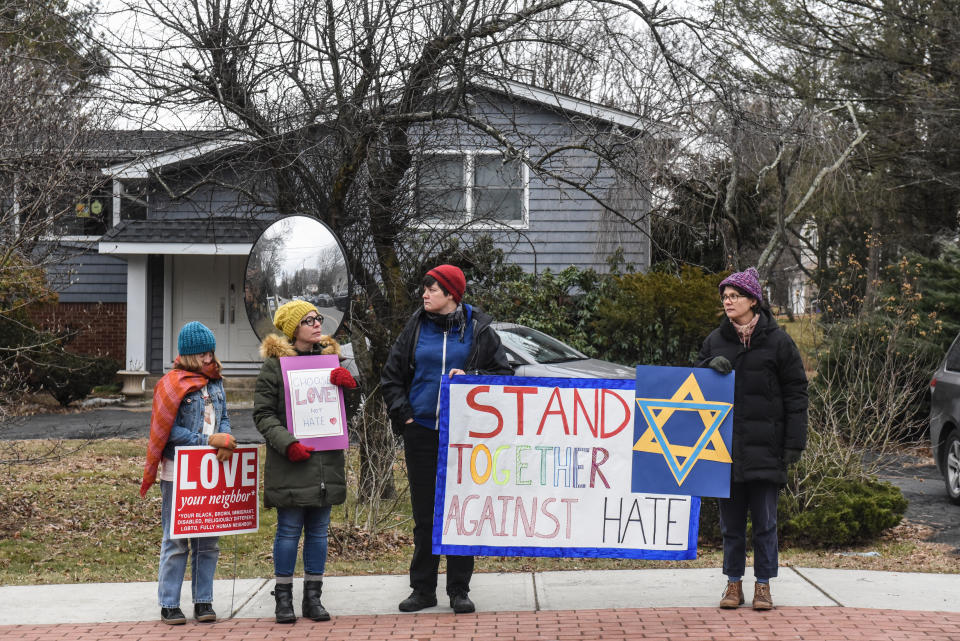
Anti-Defamation League CEO Jonathan Greenblatt told Yahoo News he attributes the recent incidents to the spread of anti-Semitism on social media, to copycat attacks and to a failure by state and local leadership to quickly condemn and address the violence. The most recent, high-profile attacks in Monsey and Jersey City have prompted public condemnation and pledges for increased funding to combat hate crimes from leaders at the local, state and federal levels, including de Blasio, New York Gov. Andrew Cuomo and Sen. Chuck Schumer of New York.
Greenblatt cites the fact that these incidents were unrelated to traditional anti-Semitism as proof that anti-Semitism is a “widespread and prevalent phenomenon.”
“Anti-Semitism is normalized,” he said, when Jewish people are attacked “in broad daylight on the street” or slandered and blamed “after they are murdered in the supermarket where they shop.
“We are deeply alarmed,” Greenblatt added, noting that anti-Semitism is “a sign of decay in a democracy.
“Jews are typically the first targets, never the last,” he said. “What’s really troubling is what’s around the corner in terms of broader unrest and violence.”
_____
Read more from Yahoo News:
Did the U.S. 'assassinate' Iranian general or just kill him? Why it matters
Saudis warn of new destructive cyberattack that experts tie to Iran
Your Democratic primary cheat sheet: In the run-up to Iowa, who's still in the race?
PHOTOS: Ukraine International Airlines plane crashes in Iran killing all on board


